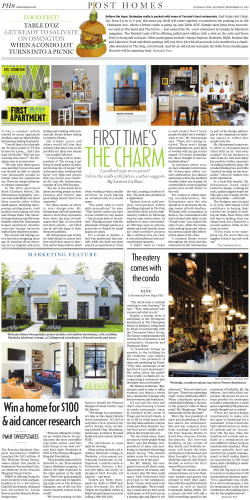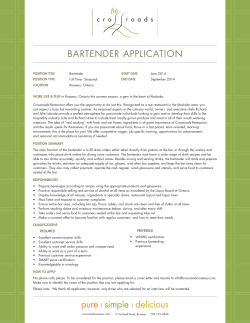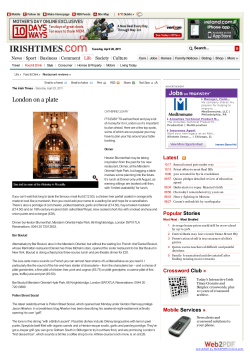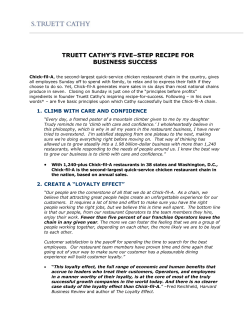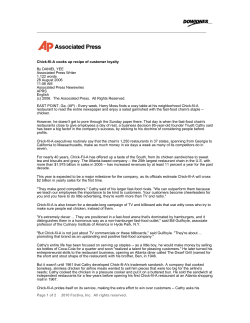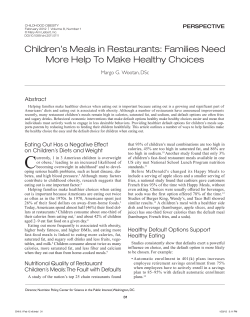
“From the Garden” at
“From the Garden” at Contents 5 FOOD MEMORIES Tracy and Drew Nieporent find inspiration in their childhood restaurant experiences. 9 CORTON Chef Paul Liebrandt melds the tradition of classical cuisine with a contemporary approach to ingredients and technique. 12 KING OF THE HILL Exploring the impressive grand cru of Burgundy. 14 INHERITED TALENTS Chef Aarón Sanchez and his mother, Zarela Martinez, discuss the new era of Mexican cuisine. 16 Going green A commitment to excellence. 17 HOME PLATE Highlights, happenings, and tasty banter from Myriad. Pictured on the cover: “From the Garden” Young Vegetables, Fruits, Herbs of the Season To the left: The dining room and bar at Corton the myriad restaurant group magazine 3 Gary Farrell is an artisanal winery that creates superlative, hand-crafted wines for the fi nest food experiences. Through exceptional vineyard sourcing and a meticulous, hands-on approach to making wine, Gary Farrell has been propelled to Artisan winery renowned for its hand-crafted, cool climate wines Exceptional sourcing from premiere vineyards including Rochioli, Cresta Ridge and Starr vineyards Sophisticated wines that complete the finest food experiences and appeal to passionate enthusiasts & collectors 4 %JTUSJCVUFECZ8+%FVUTDI4POT-UE)BSSJTPO/:XKEFVUTDIDPN the forefront of cool climate producers. History CHILDHOOD MEMORIES BECOME THE INSPIRATION FOR RESTAURANT SUCCESS Anyone who operates a business starts with some kind of inspiration. Often it’s memories from childhood that set a career in motion. That’s how our involvement in the restaurant business began. Our dad, Andrew Nieporent, was an attorney who did legal work for restaurants. Our mom, Sybil Trent, was an actress. As a result, when we were youngsters, we often went out for dinner as a family. We ate in a wide range of different restaurants, with many different themes and cuisines. We tasted the foods of diverse cultures, sat at tables in many different dining environments, and observed the work ethic of chefs and waitstaff. My brother, Drew, was fascinated by the many atmospheres we encountered and knew from his early teens that this would be his life’s work. He was fascinated by every aspect of the business, in both the front and back of the house, and absorbed a wealth of technical knowledge. We always sat at the table in such a way that he would have the best view of all the hustle and bustle around us. My passion for the business came later. During those early days, my primary mission was just to eat and enjoy the theatricality of the restaurants and the company of our family. It is no surprise that many of the happiest memories of childhood happened at the dinner table of restaurants. These restaurants of 40 years ago are now all gone and sadly forgotten in the sands of time. But they are part of our DNA and have a profound influence on us. Let me take you on a brief visit back in time to some of New York City’s places in which we were raised and that made an indelible impression on us. Headquarters Restaurant was run by Johnny Schwarz, chef to General Dwight D. Eisenhower during World War II. The name re- ident—displayed all over the restaurant, along with other nations’ generals and world leaders. The room had a larger-than-life quality, with flowing draperies on the ceiling, a Headquarters Restaurant 108 West 49th Street, near Radio City, opened in 1946. seated balcony, and banquettes surrounding the many tables. Frank McGee, the NBC anchorman, often did live radio broadcasts and interviews from a corner table. There was always great people watching at Headquarters, and a feeling of excitement that something big was about to happen. Our favorite moment was dessert, which always came with a sparkler on top. Johnny said, “If you can blow out the sparkler, you get to keep the restaurant”— but as hard as we blew, we ferred to Eisenhower’s own headquarters, and there could never blow the sparkler out. Every one of our res- were huge photographs of the general—soon to be pres- taurants has been opened the old-fashioned way. the myriad restaurant group magazine 5 © 2006 Nestlé Waters North America Inc. At finer restaurants in Paris, London, New York and of course, Milan. History Mike’s Ship-A-Hoy probably was the first theme restau- We also dined at several French restaurants, which chal- rant, although the idea for such restaurants was still de- lenged our limited knowledge of etiquette and forced cades into the future. Mike’s was a white-tablecloth restau- us to be little gentlemen when being little barbarians rant, with each table placed in the middle of an individual was more our style. Here, a jacket and tie were required, boat. It was so exciting to climb in your own boat within a hushed tones were appreciated, and formality was the huge dining room. I never wanted to abandon ship. rule rather than the exception. We discovered food that Chez Giselle was an American restaurant with French overtones that had wonderful hospitality. Drew and I had a sibling-rivalry dispute there one evening, and our parents had some sharp words for us. Our heads down on was sublime, and it expanded our culinary horizons by light-years. Whether it was L’Amerique, Cafe Argenteuil, or La Potinière, we developed an appreciation for the craft of cooking and devotion to service. the table, we were downcast after the rebuke. Suddenly, a All of these experiences during our formative years helped familiar-looking man with a Beatles-esque haircut walked build a foundation of professional knowledge that serves over to our table and started mugging at us, trying to turn us well today. The different types of dining experiences our frowns upside down. It was Moe Howard of The Three we enjoyed inspired us to present the cuisines of multiple Stooges! We were thrilled—it was Moe! During the course cultures and sensibilities in our own restaurants. of the evening, Drew and I walked over to his table several times, and he was gracious and accommodating with autographs and snappy repartee. In October 2003, we had an experience that summed up for me the satisfaction and pride we feel in being in the restaurant business, and also what it takes to be successful. At D’Angelo’s, Chef Charlie D’Angelo and his wife, Italia, Bruce Springsteen and the E Street Band played a three- were the consummate hosts at a theater-district restau- and-a-half-hour concert at Shea Stadium to culminate a rant that served everyone from Frank Sinatra to Heavy- yearlong worldwide tour, and then had the after-party at weight Champ Floyd Patterson. The food was hearty and Montrachet (now Corton). Having played over 120 shows, substantial, but what always impressed me most was everyone was going to go their separate ways after this Charlie’s work ethic. He would come to our table, sweat night, and Bruce expressed to each band member his on his brow, with a towel wrapped around his neck, and appreciation. He thanked them for their work ethic, per- talk with pride about his work. He never complained and sonal integrity, sacrifice, and commitment. He said they never had any expectations of fame or fortune; it was the had done good work and made a lot of people happy. He quality of the work that was most important. That lesson concluded simply by saying, “And that’s good!” Not that has never been forgotten. we need any more competition, but Bruce would make a Ralph’s was the neighborhood Italian restaurant that every neighborhood aspires to have. It was a storefront pizzeria in the front and a hearty Italian restaurant in the Photos, from top: Nieporent family, Al Green’s interior, La Potinière, Al Green’s exterior helluva restaurateur. Tracy Nieporent is Director of Marketing and Partner in the Myriad Restaurant Group, and Restaurant Chairman of NYC & Co’s Restaurant Committee. back. It was a refuge for Mayor John V. Lindsay, who had previously been the neighborhood’s congressman. There were photos of Lindsay in moments of accomplishment on the walls, and many provocative political discussions bounced from table to table. I could never quite understand what Ralph was saying, because with his heavy Italian accent and fractured English, Lindsay sounded like “Lince,” Nixon was “Nix,” and Hubert Humphrey was “Umph.” One thing I did understand was that virtually all of Ralph’s customers left the restaurant smiling. Al Green’s restaurant was a classic luncheonette on Sixth Avenue in the days before all the skyscrapers, like the Time-Life Building, were erected. Their motto was “Every Morsel … A Bite of Heaven,” and they were serving satisfying comfort food before anyone had even coined the phrase. the myriad restaurant group magazine 7 Hewitt Vineyard | 1695 St Helena HigHway | rutHerford, Ca 94573 | 707.968.3633 New Beginnings CORTON The psychologist James Hillman once said, “People come to New York to find the ambiance that will evoke their best. They do not necessarily know precisely what that might be, but in New York they will discover it.” Chef Paul Liebrandt’s New York discovery has ing public. Liebrandt has been described as “daring” been ten years in the making—but with each and a “wunderkind” because of his playful use of ingre- step his vision is more focused and the cumula- dients and imaginative compositions, but it is his per- tive experience he has amassed has undoubt- fectly executed technique, firmly grounded in French edly led him to Corton. tradition, that keeps the fans coming back. Among Ten years ago, when Liebrandt first arrived in New York from England, he had no job lined up but was in pos- those fans is Drew Nieporent. When the time was right for both of them, Corton was born. session of two key features: ambition and a resume There may not be another restaurant in the city that sparkling with recent tenures at both Pierre Gagnaire has the provenance of Corton. Formerly Montrachet, in Paris and Le Manoir aux Quat’ Saisons in Oxford. The Drew’s beloved first Tribeca venture, the space is near latter secured him a position as chef de cuisine at Bou- and dear to his heart. But Paul Liebrandt, with his ley Bakery but the former propelled him to culinary starred reputation and boundless creativity, was the eminence. Atlas, Papillon, Gilt—all restaurants at which perfect fit for the next stage of 239 West Broadway. Liebrandt was executive chef—earned multiple stars As for the name, it should be noted that Corton is the from the critics and accolades from the New York din- largest area of grand cru in Burgundy and lies not far > the myriad restaurant group magazine 9 from another grand cru, Montrachet. “The name is Liebrandt seeks out his ingredients with the same no coincidence,” says Drew. “I want people to see the passion that he brings to his creative process. Eggs are continuity. Like Monrachet, Corton serves delicious sourced from Violet Hill Farm, and Liebrandt consid- food of the highest quality in a room with no bad ers them to be nothing less than perfect. “The quality tables and no pretension.” is so high, so pristine, and when they are alone on Drew’s downtown vibe suits Liebrandt’s cooking, which may be grounded in tradition but nevertheless offers food connoisseurs a casual surprise here and there. Chef Liebrandt considers his food to be “modern French,” but this simple moniker somehow minimizes the tremendous thought and effort that to be.” Honey Locust Farm provides Corton’s quince, shiso, and wild arugula. Game is flown in from Scotland. And what he cannot find, he makes himself, like the vadouvan, a specialty spice mixture that he uses to braise cobia, a tropical fish. go into the preparation of each dish. Partridge is pre- Those who come to Corton seeking the comfy ban- pared as a special, with a slow-roasted breast and leg quettes of old will be surprised at how the space has cooked à la royale. They are paired with red cabbage been transformed. The renovation has resulted in a and quince, whose silky texture and floral flavors perfectly complement the delicate meat—it is autumn on a plate. A dish for which Liebrandt has received justifiable attention is his Foie Gras with Beet Borscht Gelée and Blood Orange. Rather than clarified with egg whites, Liebrandt’s consommé is fortified with the slightest bit of gelatin: frozen, dripped gently over Photo: Robert Leslie the plate with nothing but sweetbreads, they have cheesecloth to achieve its silken texture, then gelled in paper-thin sheets. The resulting borscht gelée envelops the foie, and every mouthful is imbued with a subtle, balanced sweetness. clean, romantic, unpretentious room with a clubby, personal atmosphere—a perfectly simple space to showcase food that is simply perfect. Drew, who has opened 31 restaurants in 23 years, clearly has an eye for talent, and what he has created in Corton is the perfect ambiance for Paul Liebrandt to evoke his best. l Pictured from top right: Foie Gras Hibiscus-Beet Gelée, Blood Orange Beausoleil Oyster Toasted Buckwheat, Candied Grapefruit, Nutmeg Oil Red Kuri Squash Soup Tempura of King Crab Tail Gianduja Palette Kalamansi, Rose, Cocoa Nib 10 the myriad restaurant group magazine the myriad restaurant group magazine Corton KING OF THE HILL By Lisa Granik Driving around the broad expanse of the Corton hill in France’s Côte de Beaune, one cannot fail to be impressed. This is home to the largest grand cru Burgundy; at over 160 hectares, it boasts over one-third of the total grand cru vineyard area in the region. Corton-Charlemagne, one of the finest wines produced in the region, has the distinction of having been one of the French Emperor’s personal land holdings, so prized was its terroir, even in that day. Charlemagne also had a special request: that all the vineyards of the hill be planted in white. The red wine stained his famous white beard. 12 Additionally, it is one of only two grand crus in all of The red Cortons themselves are big wines too—closed, Burgundy, producing grand cru wines from both Pinot tight, and awkward when young, but with concentra- Noir and Chardonnay. Capped by the Forêt de Corton, tion, depth, and sappy grip; after almost a decade in vines flow down and wrap around the hill, overlooking the bottle, the dark, succulent red fruits bloom and are the three different Burgundy communes that lay claim complemented by a sweet, earthy, gamey complexity. to part of it: Ladoix, Aloxe, and Pernand. While Corton They, too, enjoy royal lineage beyond Charlemagne, as rouge is the only grand cru red Burgundy of the Côte immortalized in the single vineyard Clos du Roi, one of de Beaune, the appellation is perhaps best known for the top red crus juxtaposing power and elegance. its majestic white wine, the Corton-Charlemagne. The Of course, due to the large property, the different Cor- majesty fits, perhaps, as Corton itself was the favorite ton vineyard plots are not created equal, each having domaine owned by Charlemagne, Charles the First of different soil types, orientation to the sun, altitude, and France. For much of his life, Charlemagne’s vines were microclimates. One can’t see it on the long drive around all red. But as Clive Coates, Master of Wine, relates, Char- the hill, but walking through the vineyard, its variegated lemagne in his later years ordered the planting of white soils are obvious. In Les Pougets, for example, one of a grapes to assuage his wife, who was concerned that handful of delimited vineyards producing both red and the frequent red-wine stains sullied not only his white white wines, one sees lighter, chalky areas, on which beard but also his reputation. As for the wine itself, it Chardonnay is planted for the Corton-Charlemagne. is relatively austere, even severe, requiring aging for at Further along, the soil turns to darker, iron-rich marl, in least a decade before it comes into its own. Corton- which Pinot Noir is planted for Corton-Pougets. These Charlemagne is a steely wine, with racy acidity: at its are the types of differences allowing a diversity of Cor- best, round, elegant and rich, and capable of aging for ton styles, both red and white, and, happily, providing us at least 20 years. with some wines we need not wait a decade to enjoy. the myriad restaurant group magazine Woodford Reserve: T he Art of Cl a s sic Coc k tail s Classic cocktails are making a big comeback, largely because bartenders – now known as mixologists – have found delicious new ways to serve up old favorites. Take the historic Manhattan for instance. In addition to its widely-debated origin -- some believe it was created for a grand party in New York hosted by descendants of royalty -- its definition is often debated as well. No matter, because it has evolved into an array of full flavored, creative drinks being discovered by a whole new generation. There is one truth that stands above the fray; the best ingredients make the best cocktails. Full flavored drinks demand a balanced and complex bourbon – and Woodford Reserve fits the bill. Now the experts may write about its “faint aromas of apricot and brown sugar” or its “hints of woody vanilla-tinged spice,” which is all well and good. But what’s most important is that you simply enjoy your Manhattan, or your classic cocktail, or your own unique take on mixology! Please enjoy Woodford Reserve responsibly. www.woodfordreserve.com Woodford Reserve Distiller’s Select Kentucky Straight Bourbon Whiskey, 45.2% Alc. by Vol., The Woodford Reserve Distillery, Versailles, KY © 2008. Timeless cocktails made modern with Woodford Reserve, gold medal winner of the world’s three most prestigious tasting competitions. The Woodford Manhattan 2 oz. Woodford Reserve® 1 oz. sweet vermouth 1 dash Angostura® bitters 1 dash Peychaud’s® bitters Splash of cherry juice Fill a cocktail shaker with ice. Add ingredients and shake well. Strain into a chilled martini glass. Garnish with a bourbon-infused cherry. The Woodford Mediterranean Manhattan A drink this flavorful calls for a complex bourbon - Woodford Reserve. 2 oz. Woodford Reserve® 1 oz. Tuaca® liqueur 1/4 oz. fresh lemon juice 1/2 oz. simple syrup* Fill a cocktail shaker with ice. Add ingredients and shake well. Strain into a chilled martini glass. Garnish with a twist of lemon. * Simple syrup: boil equal parts water and sugar until sugar dissolves. The Woodford French Manhattan Woodford Reserve adds balance to this delicious, refreshing concoction. 2 oz. Woodford Reserve® 1 oz. Chambord® Dash of bitters Shake ingredients with ice and strain into a martini glass. Garnish with a lemon twist or cherry. Interview INHERITED TALENTS One late fall day, Aarón Sanchez, chef and co-owner of Centrico, sat down with his mother, Zarela Martinez, the fabled chef and owner of Zarela’s, to discuss the past, present, and future of Mexican cooking in New York. I think my mom established a real appreciation for classical dishes done well, which allows me to be a bit more adventurous. To both: Where are we today in terms of our Mexican culinary education? Aarón: We’re in a good place these days. Contemporary Mexican food can really command the same standards as contemporary European food, which shows how far we’ve come. Zarela: These days, New Yorkers want to know how to make their own tamales, how to work with fresh masa. My YouTube video that demonstrates how to make tamales gets 8,000 views a day—this shows you how far we’ve come! At the beginning, there was very little interest in Mexican culinary traditions, but at this point our customers have taste memories that they want to recreate. To Zarela: How would you describe your role in the expansion of New Yorkers’ idea of what Mexican cuisine is? Zarela: When I first opened Zarela’s, I was attempting to cook contemporary interpretations of Mexican food. Then after I had traveled around Mexico extensively, I asked myself, Why reinvent? Since then I’ve dedicated myself to exposing New Yorkers to Mexico’s rich culinary heritage, and I think I’ve been successful. Chiles en nogada is a specialty of Puebla that is prepared in celebration of Mexican Independence Day—the colors green, red, and white represent those of the Mexican flag. It consists of poblano peppers stuffed with pork and fruit and served with walnut sauce and pomegranate seeds. To Zarela: What were your early frustrations? Did you meet with much resistance? Did people come in and expect the same-old-same-old? Zarela: I have a funny story about this, actually. One day Barbara Sinatra came in to Zarela’s with her whole entourage and called me over to her table. “I want a taco,” she told me. I said, “I’m sorry, we don’t serve tacos.” So she said, “You will serve tacos, because your whole experiment will be a failure!” And here we are, 21 years later! To Aarón: What about your more modern cooking? Do you find people open to it, or are they still more comfortable eating what they understand? Aarón: What’s interesting at Centrico is that, for the most part, our customers are very sophisticated. They are open to new interpretations, and they have a good base of knowledge about traditional Mexican foods. 14 the myriad restaurant group magazine To Aarón: If your mother is at the beginning of the spectrum for New York, where do you see yourself? Your mother has been a tireless advocate for Mexican cuisine—its history, region, complexity—do you see yourself as picking up this mantle, or do you see yourself taking another direction? Aarón: I absolutely see myself picking up that mantle. I couldn’t cook without believing it its cultural significance. To both: What is the role of Centrico? Aarón: I think my mom and I tell different stories. My mother’s story is of a Mexican woman; mine is of a Mexican growing up in the States. I was influenced by other great chefs that my mom wasn’t exposed to. Zarela: Aarón cooks my mother’s food but in a contemporized way. That’s really the way upperclass housewives in Mexico cooked: homey but sophisticated. To both: Zarela, professional cooking is grueling; did you try to talk Aarón out of becoming a chef, or did you encourage him from the start? Aarón, can you think of anything specific that inspired you about your mother? Zarela: I always let my children do as they wanted. I told them that if I was happy, they would be happy, and if they were happy, I would be happy. Aarón has been in the kitchen since he was ten years old. Aarón: I think my mother’s pure passion for food was what inspired me specifically. It’s not as if we had Mexican food every day at home. My mother exposed us to the cooking of the world. She was dedicated to expanding our culinary horizons. To both: What do you see as the future of Mexican cuisine in the United States? Will we see more restaurants showcasing regional specialties, or will we see it fused with other cuisines? Zarela’s Chilaquiles In Mexico, chilaquiles are served for breakfast and are traditionally made by cooking tortilla strips in a simmering sauce, adding the grated cheese, chicken, and cream at the end and baking until heated through. (Recipe from Food from my Heart by Zarela Martinez, Macmillan, 1997) l2 commercial corn tortillas 1. Preheat oven to 325 degrees. Zarela: I think we’ll see more regional cooking that reflects immigration patterns. We’ll see restaurants dedicated to the cooking of Veracruz, Oaxaca, and the northern states. 2 cups vegetable oil for frying Aarón: I don’t think Mexican food would fuse well. It’s too close to the fabric of Mexican life. 2 cups Crema Agria Preparada 2. Cut tortillas in half; stacking a few at a time, cut into l/4-inch strips. In large heavy saucepan or deep fryer, heat oil to 350°. Fry tortilla chips in batches, a large handful at a time (do not try to use more). With a skimmer, remove each batch immediately as soon as it stops sizzling; tortilla pieces will scorch if left in longer. Drain on paper towels and let cool completely. 3. Combine tortilla strips, shredded cheese, and To both: Is there a dish that you both serve? Have you personalized this dish, or do you prepare it the same way? l pound white cheddar cheese, shredded 3 cups Pollo Guisado (p. 000) l l/2 cups Salsa de Tomatillo con Crema (recipe follows) Aarón: My chilaquiles, which I consider to be a comfort dish, has a slightly different sauce made with only tomatillos. Zarela: My chilaquiles are all about layering. I use dayold tortillas and then fry them, the chicken is cooked with loads of herbs and then sautéed, the tomatillo sauce is thickened with crushed tortillas, and the crema is combined with onion and cilantro. It’s layer upon layer of flavor. To both: Is there a particular dish you dream of introducing to New York? Aarón: I would love to serve little carp-roe tacos, which come from Chapala. They are delicious, but they have a very particular texture. Zarela: No, my favorite dish is whatever I’m making right now. And I can do what I want. Every weekend we have specials that are more unusual. To both: Is there a particular dish that is so perfect that neither one of you would ever make changes to it? Zarela: Chiles en nogada. This is the most perfect dish. Aarón: I would never change sopa seca. I make it the same way my mother does, and it’s perfect. To both: Who is the bigger influence on the other these days? Do you seek each other’s opinion in the creative process? Zarela: Aarón helps me with presentation; I don’t decorate plates. He is also more technically adept than I am. But he’s really on his own path. Aarón: My mom will never really stop influencing me. She has a phenomenal palate that only comes with experience. But I’ve learned so much about the restaurant business working with Drew, and I try to convey these things to her. POLLO GUISADO Poached and Sautéed Chicken Cooked meat from one 3 l/2-pound chicken 2 tablespoons lard or vegetable oil l small onion, finely chopped (about l/2 cup) l small clove garlic, finely minced (about l teaspoon) Salt and freshly ground pepper to taste 1. Pull chicken meat into shreds. 2. Heat lard or vegetable oil in large saucepan or wide sauté pan until hot but not smoking. Add onion and garlic; cook until translucent over medium heat. Add shredded chicken, stirring well to distribute ingredients. Season with salt and freshly ground pepper. Let cook 5 minutes, stirring occasionally, to blend flavors. Yield: About 3 Cups quickly but can be held a couple of days tightly covered in the refrigerator. Yield: Slightly More Than 2 Cups SALSA DE TOMATILLO CON CREMA Tomatillo Sauce with Cream Canned tomatillos are really a last resort here. They taste nothing like the real thing. Chilaquiles are only the beginning of what you can do with the sauce. It is wonderful with grilled or poached fish, especially salmon, or pan-fried chicken cutlets. l pound fresh tomatillos, husks removed (about l2 large tomatillos), or one l5-ounce can tomatillos, drained l/4 cup vegetable oil l commercial corn tortilla l small onion, chopped 2 cups cultured sour cream 1 small onion, finely chopped (about l/2 cup) 1 small garlic clove, minced (l teaspoon) 2 tablespoons finely chopped cilantro leaves Salt to taste Combine all ingredients and let rest 5 minutes to blend the flavors. It loses its freshness 1. Place fresh tomatillos in a medium saucepan and add water to cover (about 3 cups). Bring to a boil and cook uncovered on high heat until tomatillos have changed color, about 5 minutes. Drain, reserving l/2 cup of the cooking liquid. If using canned tomatillos, omit this step. 2. In small heavy skillet, heat the oil until almost sizzling and fry the tortilla until crisp and golden. Drain it on paper towels and when cool enough to handle, break into pieces. 3. Place the cooked tomatillos with the reserved liquid in container of blender. (If using canned tomatillos, no extra liquid is necessary.) Add the chopped onion, garlic, chiles, cilantro, broken tortilla pieces, and sugar. Process for about l minute, or until smoothly pureed. l cup cilantro leaves (l large bunch cilantro, leaves stripped) 4. In a medium saucepan, heat the butter over high heat until hot and bubbling. Add the tomatillo mixture and heavy cream. Season with salt to taste. Bring to a boil over high heat; reduce heat to low and simmer for 5 minutes or until somewhat thickened. l teaspoon sugar Yield: About 3 to 3 l/2 cups. 2 tablespoons unsalted butter Can be kept up to a week tightly covered in refrigerator. It may break down and look curdled but will smooth out when reheated. 2 garlic cloves, chopped CREMA AGRIA PREPARADA Aromatic Sour Cream Mixture chicken in large bowl; toss to distribute ingredients evenly. Place the mixture in a l3 x 9-inch Pyrex baking dish or other wide, shallow ovenproof container. Spread the sour cream over the top and bake until heated through, about 25 minutes. 4. In a small saucepan, heat the tomatillo sauce just to the simmer, stirring often to keep it from scorching. Pour sauce over the casserole and serve immediately. minutes. Serves 6 to 8 2 fresh serrano or jalapeno chiles (see p. 000), stems and tops removed (more can be used to taste) l cup heavy cream Salt to taste butter or vegetable oil the myriad restaurant group magazine 15 GOING GREEN A Commitment to Excellence by Jason Colucci For me and my colleagues, working at the Myriad Restaurant Group is more than just a job. It’s a commitment to excellence, to putting out a product we’re proud of. Drew Nieporent has fostered great careers over the years, and his personal drive has made Myriad a wonderful home for people who embrace challenges and strive hard to succeed. One of our current challenges is making our restaurants greener—not just for the potential savings, but because it’s the right thing to do for our neighborhood and our environment. As Assistant Purchasing Manager, I’m pursuing lots of initiatives. How can we cut back on waste? One of our first steps was to select a garbage-disposal company that recycles all reusable materials, and retrain our staff to properly sort and dispose of trash. We’re also buying cleaning chemicals from Ecological Solutions, a company entirely focused on green products. And we’ve always been careful to order appropriate quantities of proteins and produce in order to minimize waste. Our efforts resonate with the work of the Tribeca Partnership, a terrific nonprofit organization that helps the homeless achieve economic sufficiency by training them to sweep streets and bag refuse. Myriad has supported the Partnership since its inception, part of our ongoing emphasis on community involvement. We’re excited about its new Go Green Campaign. The Partnership convinced the city to put a new recycling center in Tribeca and is pushing for more. They work with Whole Foods, which donates eco-friendly cleaning chemicals, and the Partnership is seeking a sponsor to provide biodegradable garbage bags. Initiatives like this are important to our company’s culture. If we focus on limiting waste, it encourages our staff to think before throwing things away. It’s important to our customers, too; many of them share our concerns about the environment and respect companies who are doing things to help. And it’s important to me personally. I’m proud to work with a company that always looks to do the right thing, even when it costs a little more. All this comes back to us as restaurateurs and managers. You have to believe in what you are giving to your diners, and that comes from the gut and the heart. All the hours of hard work are worth it when you see people leave your restaurant happier and more fulfilled than when they came in. Isn’t that why we do this? I know it’s why I signed up. Jason Colucci is the Assistant Purchasing Manager at Tribeca Grill. 16 the myriad restaurant group magazine Home plate Highlights, Happenings, and Tasty Banter From Myriad AWARDS AND RECOGNITIONS Tribeca Grill Wine Spectator Grand Award Nation’s Restaurant News Fine Dining Hall of Fame John Mariani’s Top Rated Restaurants and Chefs in America, Tribeca Grill & Chef Stephen Lewandowski Food & Beverage Business 40 Best New York Restaurants Nobu Food & Wine magazine Hall of Fame inductee, Nobu Matsuhisa Corton “At Corton Mr. Liebrandt finds the sweet spot between disciplined cooking and intricate, imaginative leaps. … Corton’s accomplishments warrant more attention and give it a fighting chance, in a difficult economy, of success. Mr. Liebrandt deserves that, because he’s pulled off his most meaningful trick yet: a place where it’s a joy to eat.” hhh, Frank Bruni, The New York Times “The best new restaurant I’ve visited this year … food so finely wrought, it’s more than able to hold your attention.” hhhhhh, Jay Cheshes, Time Out New York “… as dinner progresses you get a sense of time suspended, of being pleasantly inoculated from the cares of the outside world … it’s a relief, at least for one evening, to see things being done right.” hhhh, Adam Platt, New York Magazine “It’s the most important restaurant to open in the city this fall. The meals I had at Corton were extraordinary, putting him in a realm with the city’s greatest chefs … Corton manages to be grown-up and hip at the same time.” hhh½, Moira Hodgson, New York Observer “Corton, Drew Nieporent’s superb new restaurant … is really all about great food and service. It’s no surprise that the man whose Montrachet sparked TriBeCa’s renaissance 23 years ago creates with even greater style and finesse for the 21st century.” hhhh, Bob Lape, Crain’s New York Business “Drew Nieporent Remains King of Tribeca with Corton” hhh, Ryan Sutton, Bloomberg.com PLUS: Squab at Corton: Number 2 out of 100 best dishes of 2008 Time Out New York, Dec. 11, 2008 2008 All-Star Eateries in New York Steve Forbes, Forbes, Nov. 27, 2008 Did you know that New York City’s Restaurant Week is the single largest dining celebration in the United States? It’s true. Nowhere else can diners find a program that brings together more than 230 outstanding restaurants, working together to demonstrate the quality, variety, and hospitality that makes New York City truly the dining capital of the world. ists alike. And now, more than 230 restaurants participate every year. In all started in 1992, when Tim Zagat, the late Joe Baum, and Alan Stillman implemented a special $19.92 Summer Restaurant Week three-course lunch menu. They originally did it to entice delegates attending the Democratic National Convention—and to get New Yorkers out dining again during a difficult economic period. Sound familiar? The 25 participating restaurants were filled with diners, and the program has continued to evolve, getting bigger and better since that time. Now entering its 18th year, Restaurant Week offers lunch and dinner options, a summer and winter program, and two weeks for each season—a total of four weeks. Three-course lunch is served for $24.07, because New York is the city that is always hopping, 24/7. Threecourse dinner is $35. It’s a tremendous value that has captured the appetites of New Yorkers and tour- spirits. The two-hour mini-vacations we offer can be rejuvenating, providing a sense of well-being. This celebration of dining reminds New Yorkers and visitors of how special and unique we are. During difficult economic times, Restaurant Week is embraced in a way that’s particularly consequential. That’s because many of life’s most meaningful moments occur at the dining table, where friends and family share their hopes, dreams, and anxieties. Restaurants provide a context to celebrate life and renew one’s So as you dine during New York City’s Winter Restaurant Week in January and Summer Restaurant Week in June, you truly are part of something that is meaningful and important. Sure, following New York’s lead, there are now restaurant weeks in other cities. But when you participate in New York City’s Restaurant Week, you participate in the original program that leads the way. You are part of a restaurant community that is the finest in the world. Tracy Nieporent, Director of Marketing and Partner in the Myriad Restaurant Group, is also Chairman of NYC & Co.’s Restaurant Committee. NYC & Company is the official marketing and tourism organization for New York City. the myriad restaurant group magazine 17 HauteNotes Publisher Michael Goldman From the publisher, Haute Notes is about the discovery of all things innovative Editor-in-Chief Pamela Jouan and exciting in food and wine, art and design, and style and travel. Visit hautenotes.com. Design Director Jana Potashnik BAIRDesign, Inc. HAUTEPhoto HAUTEMIXOLOGY Managing Editor Christian Kappner Michael Harlan Turkell is a freelance photographer and free-time cook who used to work in restaurants but now photographs the inner workings of kitchens for his “Back of the House” project. His work was recently published in 25 Under 25: Up-andComing American Photographers, Volume 2, published by powerHouse Books. He is also the photo editor for Edible Manhattan and Edible Brooklyn magazines, which promote borough-centric food culture. He currently lives in Brooklyn but will travel far and wide for food and drink. Visit www.harlanturk.com. Woodford Reserve Manhattan 2 oz Woodford Reserve 1 oz sweet vermouth 1 dash of Angostura bitters 1 dash Peychaud’s bitters splash of cherry juice bourbon-infused cherry Fill a cocktail shaker with ice. Add ingredients, shake well, and strain into a chilled martini glass. Garnish with a bourbon-infused cherry. Twelve HAUTENOTEWORTHY Developed by worldclass chefs, Twelve is a sophisticated culinaryinspired, nonalcoholic beverage that is a sparkling alternative to water or iced tea. Created with a base of organic white, green, and black teas, and a select mix of herbs, spices, and citrus essence, Twelve is not only healthy and tasty on its own but also a great complement with food. Twelve is available at select restaurants, specialty food stores, and coming soon to www.MadeToTaste.com. Copy Editor kelly suzan waggoner Contributing Editors Alison Bowers lisa granik Photo Director Charles Harris Advertising [email protected] Marketing Director Katherine Payne Photography Melissa Hom Michael Harlan Turkell Frank Oudeman Robert Leslie HauteLife Press a division of C-BON MEDIA, LLC. 321 Dean Street Suite 1 Brooklyn, NY 11217 www.hautelifepress.com [email protected] Subscription Inquiries 718.858.1187 [email protected] or visit www.hautelifepress.com Printed and bound in the U.S.A. Made to taste.com MadeToTaste.com is an online shopping destination that offers a curated selection of chef-created and chef-related products. Imagine shopping in a chef’s pantry for food products, kitchen tools and accessories, and cookbooks! MadeToTaste.com also features chef demonstration videos, recipes, and wine and cocktail pairings. HauteLife Press makes every effort to ensure that the information it publishes is correct but cannot be held responsible for any errors or omissions. © 2008 All rights reserved. Reproduction without permission is strictly prohibited. myriadrestaurantgroup.com Locations ® CMYK Centrico Tribeca Grill Mai House 375 Greenwich Street 211 West Broadway 186 Franklin Street New York, NY 10013 New York, NY 10013 New York, NY 10013 Tel: 212.941.3900 18 Tel: 212.431.0700 Tel: 212.431.0606 the myriad restaurant group magazine Corton 239 West Broadway New York, NY 10013 Nobu New York City 105 Hudson Street New York, NY 10013 Next Door Nobu 105 Hudson Street New York, NY 10013 Nobu Fifty Seven 40 West 57 Street New York, NY 10019 Nobu London 19 Old Park Lane London WIY 4LB Crush Wine & Spirits 153 East 57th Street New York, NY 10022 Tel: 212.219.2777 Tel: 212.219.0500 Tel: 212.334.4445 Tel: 212.757.3000 Tel: 020.7447.4747 Tel: 212.980.WINE (9463) ©2009 Kobrand Corporation, New York, NY www.kobrandwineandspirits.com Burgundy and nothing but Burgundy Carbon negative. Globally positive. At FIJI Water our mission has always been to bring you the finest, best-tasting water on earth. To ensure this for years to come, we’re going “carbon negative.” Which means reducing CO2 emissions across all of our products. Changing 50% of our bottling facility’s energy to renewable sources by 2010. And partnering with Conservation International to help save the largest rainforest in Fiji. Making FIJI Water the first carbon-negative product in our industry. And perhaps the most positive for the world. © 2008 FIJI Water Company LLC. All rights reserved. fijigreen.com
© Copyright 2026

